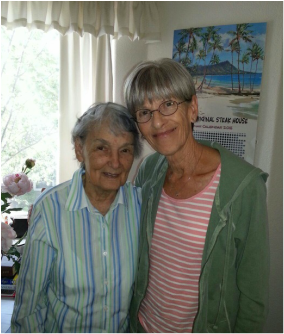 Hello! And welcome back to the Disciplers blog. It is always exciting to let you know when we have a new study available, and that is what I want to share with you today. We have been working on the study of Jonah and Nahum for many months and spent the summer editing and preparing it for download. Now it is ready for those of you who would like to spend six weeks studying these two “minor prophets”. You may wonder why we combined the study of these two particular prophets, and it is simply because both prophecies concern the Assyrian city of Nineveh. You may already know the story of Jonah, who refused God’s call and ran in the opposite direction of where God called him to go. But God pursued Jonah and by His sovereign power persuaded Jonah to preach destruction to the wicked city of Nineveh. Jonah was already unhappy with God, but when the people of Nineveh repented and God relented, saving them from destruction, Jonah was furious. Graciously, God was patient with Jonah and taught him an object lesson about his bad attitude. About one hundred years after Jonah preached and Nineveh was saved, God called another prophet, Nahum, to prophecy concerning Nineveh. This time God’s message was one of certain doom. The seemingly repentant city of Nineveh had turned back to their wicked ways and had come to represent of the epitome of evil. God’s wrath was aroused and He decreed the overthrow of Nineveh. Some people try to use the prophecies of Jonah and Nahum to point out God’s inconsistency. But the Scriptures teach that God is unchanging: For I am the LORD, I do not change (Malachi 3:6) and Jesus Christ is the same yesterday, today, and forever (Hebrews 13:8). But how do we reconcile that with the fact that God pronounced judgment upon Nineveh, then turned and saved Nineveh, but one hundred years later He pronounced the sure doom of Nineveh? G. Campbell Morgan, known as the “prince of preachers” in his day, gave a powerful and clear explanation of what, on the surface, may look like the changeableness of God. Let me share with you a portion from one of the lessons in the Jonah and Nahum study. “Some look on the surface of these two prophecies and are inclined to think they picture the changeableness of God because at first He spared Nineveh when the people repented, but a century later He says there is no room for repentance and He will destroy Nineveh. Morgan points out that ‘what appears to be change is really due to God’s changelessness. It is because God is unchanging in all the eternal sublimities of His character that He changes in His dealings towards men.’” “Morgan goes on to explain by using the picture of a weather vane. It may appear that a weather vane is one of the most changeable things on earth because it is always changing its direction in relation to north, south, east, and west. But the change we see is due to the weather vane’s unchangeable principle: it shows the direction of the wind. ‘It is always unchangeable in its adhesion to principle.’ With that in mind, the unchangeableness of God becomes clear. In Jonah’s day, His word was mercy and salvation. In Nahum’s day it was judgment and destruction. But God did not change. It was Nineveh that had changed. Morgan says, ‘God has been the same throughout all His dealings with men, and it is because He is unchangeable that when a repentant nation repents of that repentance and goes back to its sins, He repents again and smites it into dust and sweeps it away.’” The prophet Nahum seemed to understand this clearly. In chapter one, verse three he wrote, “The LORD is slow to anger and great in power, and will not at all acquit the wicked.” God was certainly slow to anger in dealing with the rebellious Jonah and with the evil city of Nineveh, but when Nineveh disdained God’s mercy, blatantly defied God’s grace, and reveled in her wicked ways in defiance of His sovereign will and power, justice was done. The city of Nineveh no longer exists. James Montgomery Boice gives us something to think about as we look at the sin and the fall of Nineveh. “We see the fall of others but somehow imagine that our Western world and cities are different. They are not. They are part of the same world ruled by the same unchanging God, and the moral laws that operated in the destruction of….Nineveh will also destroy us unless we repent and seek God’s blessing” (The Minor Prophets, Volume 2). I hope you have seen, in this blog, that the books of Jonah and Nahum are relevant for our day and have important lessons to teach us. Jonah’s and Nahum’s prophecies are short and they were written long, long ago, but God is unchanging and the important lessons He taught over two thousand five hundred years ago are for our modern world also. If you study Jonah and Nahum, you will see that human nature has not changed so much over the years either. ~ Suzie
0 Comments
 Here at Disciplers Bible Studies our aim is to encourage people to read and study the Bible. It is through the Bible that we learn about God and how He desires us to live. And that’s important because as the Creator of all things and Sovereign over all things, we need to know how to approach Him. Pretty much everyone, whether Christian or not, will come to a time in his or her life when they will feel a need to call upon God. But what is the best way to approach Almighty God? A dear friend and sister in Christ, Angela Stanley, wrote a post to her Facebook page that helps answer that question. Because of the excellence of her post and the timeliness of her subject, we want to share with you Angela’s “warning about the dangers of contemplative prayer.” Angela is both a student and a teacher of God’s Word. She serves with Shepherd’s Heart Prison Ministries in North Carolina, teaching a Disciplers class at Southern Correctional Institution. Here is what Angela wrote. “God has been focusing my mind on the dangers of contemplative prayer since a discussion on James 1:5 during Bible study this past week. As I've reflected on His Word, this is what I've found. James wrote, "If any of you lacks wisdom, he should ask God" (James 1:5). What does asking or seeking God look like? How many of you have ever discussed the need to "pray about everything"? How many of you have ever been encouraged to "spend time in prayer"? Those are Biblical commands (Philippians 4:6; Colossians 4:2; Ephesians 6:18), however, New Age thinking has now entered the church and believers are being misled. They are being told to meditate, to clear their minds so that they can hear God speak His wisdom and direction to them. But God has already spoken His wisdom and direction to us...in His Word (Colossians 316; Romans15:4; 2 Timothy 3:16). Our prayers should not be empty-minded, but should be filled to overflowing with God's Word. Our prayers are simply to reflect the directions and promises God has already given us in His Word. As we meditate upon His Word, God will guide the prayers of our hearts so that we can request whatever is needed to act in accordance with His promises and direction in our lives. We do not need to seek gnostic wisdom that no one else has yet received, or superficial peace by emptying our minds so we can be spiritually united with God. Have you ever tried to tell someone whose world is falling down around them to empty their mind and meditate on God? They can't! Fear is overwhelming them! Instead, they must overcome their fear with faith, and faith comes by hearing the Word of God (Romans 10:17). True lasting peace comes to those who meditate on who God says He is and on what He says He is capable of. We learn about that revealed God by reading God's Word, not by meditating on who we THINK God is. God never calls His people to empty their minds and meditate on who they think God is. God clearly tells us in His Word who He is, and He emphatically states repeatedly, that we are to meditate on His Word (Psalm 1:1-3; Joshua 1:8). God gives that direction so we will not be misled by other spiritual voices as we pray. Yes, OTHER spiritual voices (1 John 4:1; 2 Corinthians 11:14). If our minds are not protected by and stayed on God and His Word by the inspiration of His Holy Spirit other spiritual voices can seek to direct us (Ephesians 6:10-12). Beware of emptying your mind to seek God. In 1 Corinthians God exhorts believers to not only pray in the Spirit, but to pray with their minds as well. What are we putting in our minds so that our minds are stayed on God and His Truth during meditative prayer? Psalms 119 tells us what to put in our minds. "I will meditate on Your precepts And regard Your ways. I shall delight in Your statutes; I shall not forget Your word" (Psalms 119:15-16)."You keep him in perfect peace whose mind is stayed on You, because he trusts in You" (Isaiah 26:3). Peace, true lasting peace, can be found through prayer when one's mind is stayed on and stirred by the God of the Bible. May God's written revelation of His precepts, ways, statutes and words fill our minds to overflowing so that we are protected against any unbiblical practices...even unbiblical practices of prayer. Protect your prayer life by grounding it in God's Holy Word, ensuring that your meditations are pleasing to God's heart. Protect your prayer life by girding your waist with God's Truth and by taking up the Sword of the Spirit, God's Holy Word, before you pray (Ephesians 6:14-17). If you would like to read more on this subject, here is the link to an article written by the Christian Research Network on the dangers of Contemplative Prayer. http://christianresearchnetwork.org/topic/contemplative-prayer/ ~Angela  Last week I had the joy of visiting with my mother-in-love (law) in northern California. She is 96 years old, a beautiful and gracious Hawaiian lady! I have known and loved her for fifty-six years and it is always a great pleasure to be in her company. I have learned a great deal from her over the years, and not so much from her words as from her way of living. Although, I must say, she does give great advice, especially from her archive of Hawaiian remedies. Tutu (that is what we call her in our family - it is Hawaiian for grandmother) has not had an easy life. She has worked hard and cared for many people, but I have never heard her utter a word of complaint. What I have heard and seen is her strong commitment to the Lord and to serving others. When I first met Tutu, (she wasn’t a Tutu yet), she was busy raising her three children and caring for her aging mother. Tutu was working full time at a private school so her children could receive an excellent education. My future husband was the oldest of the three children and just starting high school at the time. After her mother died, Tutu married a man with three teen-age sons and an elderly mother. Tutu continued to work at the school and took on the task of cooking, cleaning, and caring for six children and her new mother-in-law (a sweet yet feisty Scottish lady). I saw this petite Hawaiian woman continually sacrifice her “self” and her comfort for the needs and wants of others. She was a giver and she was not a grumbler. It was many years later, that I married Tutu’s firstborn and soon her first grandson came along, making her a true Tutu. Today she has six grandchildren and thirteen great-grandchildren. She may not have had much to give them of material things but she has given and continues to give us all the kind of love that will live in our hearts forever. It is the kind of love she has always given me, the kind of love that comes from having the Risen Christ dwelling in her heart. Tutu never had very much in the way of worldly wealth, but she has always been spiritually rich. That must be why she has always had a great deal of love and joy to share. In fact, now, at the age of 96 and in failing health (although you would never know it to look at her), Tutu has not changed at all. She is still beautiful both inside and out. She ALWAYS has a smile to give! She is outgoing and encouraging to everyone she meets. She still has that warm and welcoming Hawaiian way even though she has lived away from the islands for many years. And everybody notices. Everybody sees something special in her -- including doctors, nurses, and caregivers. Oh, and one of the most important things I wanted to tell you -- in the three days I was blessed to spend with Tutu last week, I never heard her say one negative word. Instead, she constantly uplifted everyone around her, family, friends, caregivers, and strangers alike. When I think about my own life, I am ashamed of how many times I let the smile slip from my face and the times I grumble to myself, or aloud, about something that is really quite insignificant. My special time with Tutu, the quintessential gracious Hawaiian lady, has reminded me of how much I want to be like her: I want to be a living and holy sacrifice, acceptable to God (Romans 12:1). I want to be Christ-like in all I do and say. I want others to see Christ in me. I want to give from what God has given me to bless others -- even when all I have left to give is a smile and a kind word. I want my words to be full of grace and blessing, uplifting others instead of promoting myself. I want to be a true ambassador of the Lord wherever He places me. I want to be like Tutu, making the world a better place just by being in it. I thank God for giving me Tutu, a truly godly woman, as an example in my life. And I am thankful for Tutu's faithfulness and trust in the Lord. She has never wavered in all the years I have known her. I hope you have been blessed by having a faithful Christian example like Tutu in your life. Mostly, I hope you will want to be that kind of example to others. Me Ke Aloha Pumehana, Suzie |
SUZIE KLEIN
I have been involved in Disciplers since 1987, as a discussion leader, teacher, writer, and now as director. I am profoundly committed to the stewardship of this ministry which God has entrusted to me for a time. God’s word is the chief joy of my life. I cherish my personal time in the word, and I am filled with gratitude to be able to share His word with you, my fellow disciples in Christ. Categories |

 RSS Feed
RSS Feed